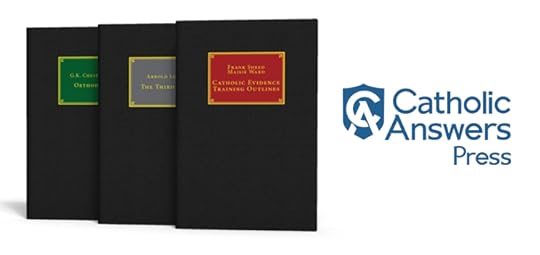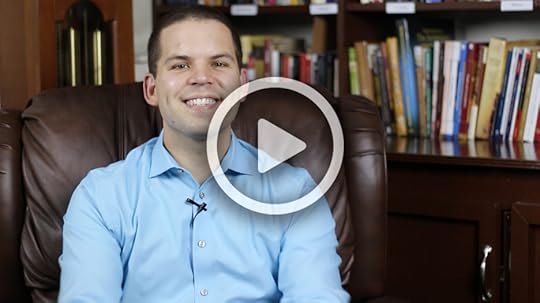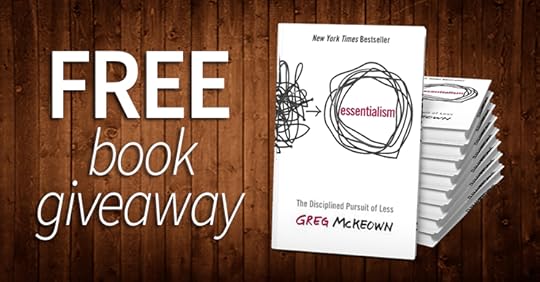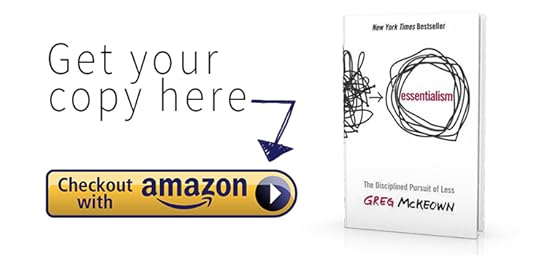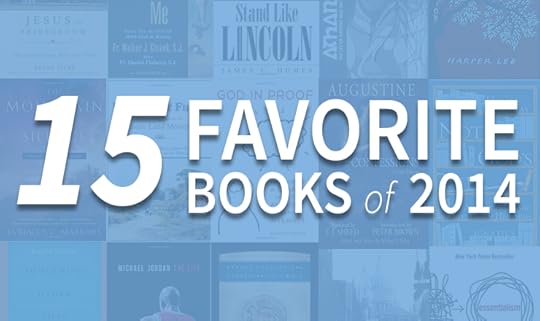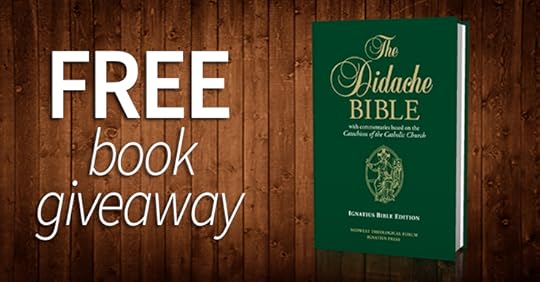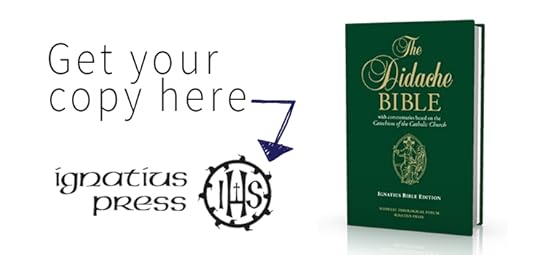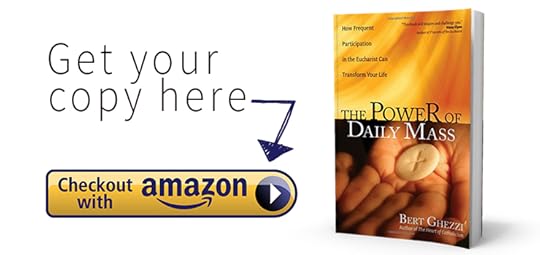Brandon Vogt's Blog, page 18
February 12, 2015
Wish You Had More Time to Read? Here’s How to Fix That…
I hope you’re enjoying my FREE video series on how to read more books. There’s lot of buzz around the series. Video #1, which I released a couple days ago, has already received 2,500 Facebook “Likes” and over 230 comments!
In that video I revealed the two biggest challenges we face when reading:
Challenge #1 – “I don’t have enough time to read.”
Challenge #2 – “I just can’t focus when I read, and so I forget most of what I read.”
In today’s video, you’ll learn how to conquer Challenge #1 (we’ll hit Challenge #2 in the next video). You’ll discover several ways to squeeze more books into each day, even when your schedule is packed:
I’m guessing you’re like me and your life is really, really busy. With work and family, meetings and practices, and all sorts of responsibilities, it’s just hard to find time to read. But with the simple, powerful strategies in today’s video, you’ll be well on your way to reading many more books.
Just click below to access your free video:
Watch here —> Video #2 – How to Make More Time for Reading
I would love to hear what you think! Click the link, watch the video, and be sure to leave a comment.
Thanks!
The post Wish You Had More Time to Read? Here’s How to Fix That… appeared first on Brandon Vogt.




February 11, 2015
3 Catholic Classics in Beautiful New Editions [Video Review]
Catholic Answers, the world’s largest Catholic apologetics ministry, continues to pump out tons of great books like Trent Horn’s Persuasive Pro Life and Tim Staples’ Behold Your Mother.
But along with new titles they’ve recently turned their attention to classic apologetical works. Their new Catholic Answers Classics Series brings back influential titles like G.K. Chesterton’s Orthodoxy, presenting them in deluxe, hardcover editions with beautiful typeset and ribbon bookmarks—the sort of books you’re proud to have on your shelf and happy to hold in your hands.
In my video review below I check out the first three books in the Catholic Answers Classics Series:
If you can’t see this video in your RSS reader or email, then click here.
(Sorry for the weird color shifts and audio! Still working out the kinks.)
You can purchase these beautiful deluxe editions here:
Orthodoxy by G.K. Chesterton
The Third Day by Arnold Lunn
Catholic Evidence Training Outlines by Frank Sheed and Maisie Ward
The post 3 Catholic Classics in Beautiful New Editions [Video Review] appeared first on Brandon Vogt.




February 10, 2015
It’s Here! My FREE Video Series on How to Read More Books
If you’re like most people, you wish you could read more. In fact, I’ve yet to meet anyone who says, “You know, I just read way too much. This year I need to read FEWER books. I just can’t handle any more life-changing insights or stories.”
Everybody wants to read more, not less.
But as we all know, it’s hard to do. Last year, 25% of American adults did not finish a single book. The average adult read only ten. Most of us struggle to squeeze a few books into our busy days, and when we actually do find time to read, it’s hard to focus and remember what we read.
That’s precisely why I created a FREE new video series teaching you how to double your reading and remember what you read.
For years people have asked me to share my reading secrets. I average 75 books per year and even topped out at 108 a couple years ago! To help the most people possible, I’ve created this free video series capturing all the best advice.
These videos are packed with powerful strategies that all great readers use. And the best part is…they’re totally free! Simply click here:
Click here to watch free videos!
In the first video, you’ll discover the two biggest challenges people face when reading. In a couple days, I’ll send you the next video which explains how to double your reading even if you don’t have tons of extra time.
I know these tips work because I’m a busy, working father with a full-time job and four children under five. Like you, I don’t have a lot of free time. Yet I’m still able to read scores of books each year using these exact strategies.
So be sure to check out your FREE video today, and stay tuned for the next video in a couple days:
I’d love to hear what you think about the video series. After you watch the video, be sure to leave a comment beneath it!
The post It’s Here! My FREE Video Series on How to Read More Books appeared first on Brandon Vogt.




February 9, 2015
“Essentialism” Book Giveaway!
“Find out how much God has given you and from it take what you need; the remainder is needed by others.” – St. Augustine
Since I’ve built up a large collection of extra books and resources, every week I give some away absolutely free, no strings attached. Each giveaway lasts seven days with a new one beginning every Friday. You can enter any time during the week. Check out my past giveaways here.
Today I’m giving away ten copies of my favorite book of 2014, Essentialism: The Disciplined Pursuit of Less by Greg McKeown. The publisher, Crown Business, saw my book post and graciously offered 10 copies to giveaway.
Essentialism: The Disciplined Pursuit of Less
by Greg McKeown
Crown Business, 272 pages, hardcover
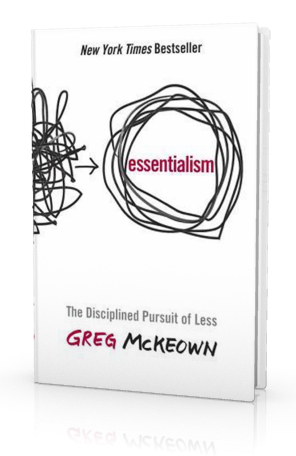 Have you ever found yourself stretched too thin?
Have you ever found yourself stretched too thin?
Do you simultaneously feel overworked and underutilized?
Are you often busy but not productive?
Do you feel like your time is constantly being hijacked by other people’s agendas?
If you answered yes to any of these, the way out is the Way of the Essentialist.
The Way of the Essentialist isn’t about getting more done in less time. It’s about getting only the right things done. It is not a time management strategy, or a productivity technique. It is a systematic discipline for discerning what is absolutely essential, then eliminating everything that is not, so we can make the highest possible contribution towards the things that really matter.
By forcing us to apply a more selective criteria for what is Essential, the disciplined pursuit of less empowers us to reclaim control of our own choices about where to spend our precious time and energy – instead of giving others the implicit permission to choose for us.
Essentialism is not one more thing – it’s a whole new way of doing everything. A must-read for any leader, manager, or individual who wants to learn who to do less, but better, in every area of their lives, Essentialism is a movement whose time has come.
I’m using Rafflecopter to help with the giveaway, which is cool because it allows you multiple entries for commenting, posting on Facebook, sharing on Twitter, etc. Click below to enter:
(If you’re reading this through email or RSS and don’t see the giveaway widget, click here.)
By entering this giveaway you agree to occasionally receive email updates from me—no spam, just updates about free books, cool links, and exciting news.
The winner(s) will be randomly selected next Friday and the books will be sent out, free of charge, shortly thereafter.
In the future I’ll be giving away more books and resources, sometimes multiple items per giveaway! So subscribe via feed reader or email to ensure you never miss your chance to win.
(Since I’m covering the shipping costs, only residents within the continental United States are eligible to win.)
The post “Essentialism” Book Giveaway! appeared first on Brandon Vogt.




February 6, 2015
Learning from a Heroic Seminarian and Martyr
Today we continue our regular series called “Learning from the Saints.” Our guide is expert Bert Ghezzi, a dear friend of mine and the author of numerous books including Voices of the Saints, Saints at Heart, and Discover Christ: Developing a Personal Relationship with Jesus.
His more recent books are The Power of Daily Mass and The Heart of Catholicism. You can learn more about Bert and his work at BertGhezzi.com.
Today, Bert profiles St. Paul Miki, a Catholic seminarian and one of the Twenty-six Martyrs of Japan.
Christianity spread like wildfire in sixteenth-century Japan. By the 1580s, less than 40 years after Francis Xavier introduced the faith, the church counted 200,000 converts. The growth had proceeded despite the opposition of Buddhist priests and many petty rulers. However, in 1587, the Emperor Hideyoshi ordered the banishment of all Catholics, forcing the Jesuit missionaries to operate from hiding. But outright persecution did not break out until late 1596, when Hideyoshi rounded up twenty-six Jesuits, Franciscans and lay people and prepared to martyr them.
 Among the victims was Paul Miki, a Jesuit novice who had just completed 11 years of training. Paul’s noble family was converted when he was a child and at age five he was baptized. Educated by Jesuits, the gifted youth joined their novitiate at age 22. He had studied intensively the teachings of the Buddhists so as to be able to debate their priests. He welcomed his chance at martyrdom, but he may have wished just a little that it would have been delayed long enough for him to have been ordained a priest.
Among the victims was Paul Miki, a Jesuit novice who had just completed 11 years of training. Paul’s noble family was converted when he was a child and at age five he was baptized. Educated by Jesuits, the gifted youth joined their novitiate at age 22. He had studied intensively the teachings of the Buddhists so as to be able to debate their priests. He welcomed his chance at martyrdom, but he may have wished just a little that it would have been delayed long enough for him to have been ordained a priest.
Hideyoshi had the left ears of the 26 martyrs severed as a sign of disrespect and paraded them through Kyoto. Dressed in his simple black cassock, Paul stood out among them. Most onlookers realized that this noble young man could have worn the Samurai’s costume with two swords on his belt. The whole display had the unexpected effect of evoking compassion from the crowd, some of whom later became converts.
The martyrs were then taken to Nagasaki. They were tied to crosses with their necks held in place by iron rings. Beside each was an executioner with his spear ready to strike. An eye witness gave this account:
“When the crosses were set up it was a wonderful thing to see the constancy of all of them. Our brother Paul Miki, seeing himself raised to the most honorable position that he had ever occupied, openly proclaimed that he was a Japanese and a member of the Society of Jesus. And that he was being put to death for having preached the gospel. He gave thanks to God for such a precious favor.
He then added these words: ‘Having arrived at this moment of my existence, I believe that no one of you thinks I want to hide the truth. That is why I declare to you that there is no other way of salvation than the one followed by Christians. Since this way teaches me to forgive my enemies and all who have offended me, I willingly forgive the king and all those who have desired my death. And I pray that they will obtain the desire of Christian baptism.’
At this point, he turned his eyes toward his companions and began to encourage them in their final struggle. The faces of them all shone with great gladness. Another Christian shouted to him that he would soon be in paradise. ‘Like my Master,’ murmured Paul, ‘I shall die upon the cross. Like him, a lance will pierce my heart so that my blood and my love can flow out upon the land and sanctify it to his name.’”
As they awaited death, the entire group sang the canticle of Zachary (see Lk 1:67-79). The executioners stood by respectfully until they had intoned the last verse. Then at a given signal, they thrust their spears into the victims’ sides. On that day, February 5, 1597, the church of Japan welcomed its first martyrs and so came of age.
(Image Credit: Japanese Christian Heritage)
Read more from Bert at his website www.BertGhezzi.com, or check out his many books on Amazon.
The post Learning from a Heroic Seminarian and Martyr appeared first on Brandon Vogt.




February 4, 2015
My 15 Favorite Books of 2014
At the beginning of each year, I reflect back on some of my favorite books of the past year. I usually try to have this list up by early January but alas, here it is. Better late than never!
I knocked out 61 books in 2014, which might be high for most people but is somewhat low for me. I failed to hit my usual 75 mark this year for a few reasons. First, we welcomed a new baby (our daughter Gianna), then a new job change (thanks Word on Fire!), and then, ironically, I spent much of my time developing a new video course on how to read more books (coming next week!)
Among those 61 books here were my 15 favorites, in reverse order:
15. Jesus the Bridegroom: The Greatest Love Story Ever Told
by Brant Pitre
Image Books, 175 pages, hardcover
Released on March 11, 2014
 I still consider Pitre’s first book, Jesus and the Jewish Roots of the Eucharist, one of the freshest and most illuminating books on Jesus’ actions during Holy Week. Pitre combined his mastery of Jewish tradition with a breezy style to breathe new life into seemingly familiar events.
I still consider Pitre’s first book, Jesus and the Jewish Roots of the Eucharist, one of the freshest and most illuminating books on Jesus’ actions during Holy Week. Pitre combined his mastery of Jewish tradition with a breezy style to breathe new life into seemingly familiar events.
His newest book applies those gifts to another area of salvation history: God’s marital covenant. From beginning to end, from Adam and Eve to Revelation, the Bible depicts the story of a wedding, a marriage between the Creator and his creation. And the central figure is the Bridegroom God, made flesh in Jesus Christ.
When we read the Gospels through the lens of Jewish nuptial language, the life and mission of Jesus shine in fascinating new ways. Pitre teaches us to see.
14. He Leadeth Me
by Fr. Walter Ciszek
Ignatius Press, 202 pages, paperback
Released on February 1, 1995
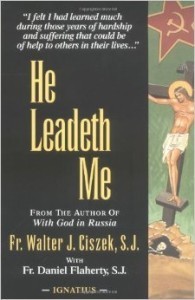 Paradoxically, this was the darkest and most inspiring book I read in 2014. Fr. Ciszek’s account of his twenty-plus years as a prisoner in Soviet labor camps is almost unbelievable in its desolation.
Paradoxically, this was the darkest and most inspiring book I read in 2014. Fr. Ciszek’s account of his twenty-plus years as a prisoner in Soviet labor camps is almost unbelievable in its desolation.
Fr. Ciszek was a young and dynamic priest, committed to evangelizing the poor in Russia, but after being captured and mistaken for a spy, he lost everything—his friends, his freedom, and nearly his sense of hope.
Yet he somehow clung to his faith, trusting not only that God would lead him out of such misery but, miraculously, that the misery itself was part of God’s permissive will, that somehow it was contributing to his own sanctification.
How can someone survive two decades in the Siberian gulags and actually emerge with more faith? How can a person bear such gut-wrenching despair and still pray, “thy will be done”? This modern-day Job story provides many clues.
13. Speak Like Churchill, Stand Like Lincoln: 21 Powerful Secrets of History’s Greatest Speakers
by James Humes
Three Rivers Press, 224 pages, paperback
Released on April 23, 2002
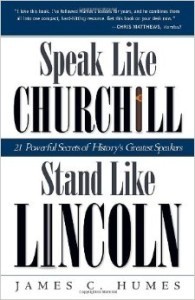 This year I spoke at over ten events and conferences. I love to give talks and I’m always trying to improve. This is one of the best books I’ve read on the topic. Many other speaking books cover things like slideshow presentations and audience interaction. Those are important but this one covers less-discussed topics like posture, body language, and rhetorical rhythm. I’ve started using these strategies and have already noticed a positive response.
This year I spoke at over ten events and conferences. I love to give talks and I’m always trying to improve. This is one of the best books I’ve read on the topic. Many other speaking books cover things like slideshow presentations and audience interaction. Those are important but this one covers less-discussed topics like posture, body language, and rhetorical rhythm. I’ve started using these strategies and have already noticed a positive response.
James Humes, the author of the book, served as a speech writer for five American presidents (!!) and has helped numerous CEOs master the art of delivering great presentations. His book is full of practical examples from some of the greatest speakers in history, many of whom he’s worked with personally. So that lets you see Humes’ advice in action (and it also confirms he knows what he’s talking about.)
If you want to become a better public speaker in 2015, pick up this book.
12. The Life of Antony
by St. Athanasius
Paulist Press, 192 pages, hardcover
Written around 360 AD
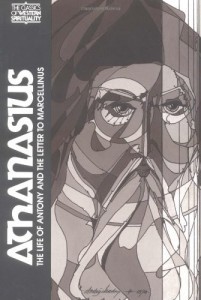 I’ve read this book twice, both times during Lent, and each time it sent a jolt through my system. St. Antony was the original desert monk, exchanging a comfortable life for a cave in order to conquer his passions. While there he practiced extreme asceticism, fasting for days, spending long hours in prayer, and isolating himself from other.
I’ve read this book twice, both times during Lent, and each time it sent a jolt through my system. St. Antony was the original desert monk, exchanging a comfortable life for a cave in order to conquer his passions. While there he practiced extreme asceticism, fasting for days, spending long hours in prayer, and isolating himself from other.
Athanasius recounts that during this time, the devil launched an onslaught of spiritual attacks against Antony. He sent wild beasts such as lions and snakes, roaring, hissing, and threatening to eat the holy monk. The devil’s goal was to tempt Antony to despair. But he did not succeed.
Another time, the devil sent demon underlings to mercilessly beat Antony, again tempting Antony to denounce the God, whom he trusted for protection. When visiting monks happened upon Antony’s cave, they found Antony covered in welts and bruises. Yet the beating did not cause his faith to waver. In fact, it grew.
Antony eventually emerged from the cave utterly in control of his passions and fleshly desires. Out of this mastery flowed a wellspring of spiritual wisdom, saved by Athanasius in the form of parables and aphorisms, words that still rumble with power today.
11. To Kill a Mockingbird
by Harper Lee
Grand Central Publishing, 384 pages, paperback
First published in 1960
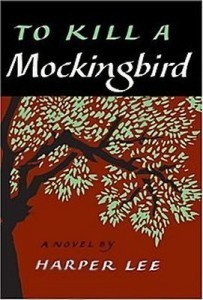 To Kill a Mockingbird was Harper Lee’s only book, which won a Pulitzer Prize and is widely considered a classic. For some reason, I never had to read it in high school (of if it was assigned, I didn’t heed it.) I had not seen the movie versions and I didn’t know anything about the book, but several friends raved about it, with more than one friend citing it as his or her favorite book of all time. All of those accolades led me to pick it up.
To Kill a Mockingbird was Harper Lee’s only book, which won a Pulitzer Prize and is widely considered a classic. For some reason, I never had to read it in high school (of if it was assigned, I didn’t heed it.) I had not seen the movie versions and I didn’t know anything about the book, but several friends raved about it, with more than one friend citing it as his or her favorite book of all time. All of those accolades led me to pick it up.
It did not disappoint. Its absorbing glimpse into the post-Civil War South evokes other Southern novelists like Flannery O’Connor, Mark Twain, William Faulkner, and Walker Percy. Lee beautifully depicts the slow country life, with its tenuous balance of idyllic living and deeply embedded racism.
Her balancing force is Atticus Finch, who emerges as one of the most admirable, heroic depictions of fatherhood in modern fiction. After closing the book, I tried to think of another fictional husband or father whom I would more want to emulate. I couldn’t think of one. Finch is marked by unwavering virtue and humility, accepting the pitiful and hopeless task of defending a black man accused of raping a white woman in the segregated South. A man who willingly sacrifices, who exudes loves for his children, who displays heroic virtue in the face of difficulty and violence—that’s the kind of man I yearn to be.
(Coincidentally, it was just announced yesterday that a second Harper Lee book has been uncovered and will soon be published.)
10. The Mountain of Silence: A Search for Orthodox Spirituality
by Kyriacos Markides
Image Books, 272 pages, paperback
Released on November 19, 2002
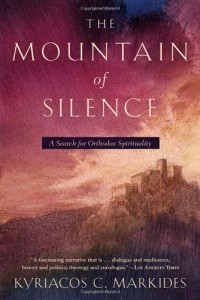 The spiritual tradition of Eastern Christianity is sometimes ignored by us in the West. But Markides’ enchanting memoir shows why its worth exploring.
The spiritual tradition of Eastern Christianity is sometimes ignored by us in the West. But Markides’ enchanting memoir shows why its worth exploring.
Markides recounts his experiences visiting Mount Athos, that heavenly summit in Greece, home to twenty Eastern Orthodox monasteries. Mount Athos is famous for its otherworldly sanctity and has long been a popular pilgrimage site among people searching for living saints.
The Mountain of Silence is mostly made up of conversations between Markides, who plays the part of a scientific, semi-religious skeptic, and Father Maximos, a wise Athos monk and legendary patriarch on the mountain.
Father Maximos’ stories are mysterious and enigmatic—many pleasantly haunted me for days. His advice on prayer on quieting the mind was especially insightful.
Pick up this book if you want to dip your toe into the rivers of mysticism and beauty found in the Orthodox tradition.
9. Flee to the Fields: The Founding Fathers of the Catholic Land Movement
by Hilarie Belloc and others
IHS Press, 144 pages, hardcover
Originally published in 1934
 The Catholic Land Movement is a small, but growing initiative which finds it roots in early-twentieth-century England. The founders included many of the brightest and most popular writers of the day, such as G.K. Chesterton and Hilarie Belloc, who collectively saw the need for a “third way” between capitalism and socialism. They devised (or reintroduced, or classified) an economic system known as Distributism, grounded on Catholic social teaching and particularly the landmark encyclical, Rerum Novarum, by Pope Leo XIII. Distributism involved spreading land ownership and the means of labor to as many people as possible. In other words, anti-Industrialism. Or in Catholic parlance, a “subsidiarity” economy, one based on the family.
The Catholic Land Movement is a small, but growing initiative which finds it roots in early-twentieth-century England. The founders included many of the brightest and most popular writers of the day, such as G.K. Chesterton and Hilarie Belloc, who collectively saw the need for a “third way” between capitalism and socialism. They devised (or reintroduced, or classified) an economic system known as Distributism, grounded on Catholic social teaching and particularly the landmark encyclical, Rerum Novarum, by Pope Leo XIII. Distributism involved spreading land ownership and the means of labor to as many people as possible. In other words, anti-Industrialism. Or in Catholic parlance, a “subsidiarity” economy, one based on the family.
Today, a growing number of Distributists follow in their footsteps, seeing the need to “flee to the fields” in response to the spiritually-deadening effects of urban/suburban Industrialism. These Distributists are not escaping but pursuing—their “fleeing” is to something (the fields) rather than from something. They see that while factories and cubicles pull fathers away from their families for most of the day, the fields keep them home. Where modern capitalism puts wealth in the hands of a few, Distributism brings ownership and labor back into the hands of each common man, allowing him control of his own destiny (and his own dignity.)
I’ve been deeply drawn to this philosophy over the past year, in part through my G.K. Chesterton reading group, but also because so many of my heroes espouse it. Besides Chesterton and Belloc, you can see Distributism throughout the fiction of J.R.R. Tolkien (the Shire is the Distributist ideal) and in Pope Pius XI’s Quadragesimo anno and the writings of Pope Francis.
Which brings me to Flee to the Fields. This book, a collection of essays by the founding fathers of Distributism and has become a sort of field manual for the Catholic Land Movement, the social movement based on the Distributist economy. While a few of the contributions are heady and abstract, most are practical and clear. They persuasively argue that, to paraphrase Chesterton, the Distributist ideal has not been tried and found wanting; it’s been found difficult and left untried.
If you want to understand Distributism and see why so many Catholic intellectuals embrace it, this book is an excellent primer.
8. God in Proof: The Story of a Search from the Ancients to the Internet
by Nathan Schneider
University of California Press, 272 pages, hardcover
Released on June 10, 2013
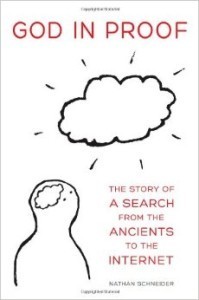 Over the last couple years, thanks to my work at StrangeNotions.com, I’ve focused lots of reading on natural theology, philosophy, and atheism. I’m fascinated by arguments for and against God—Aristotle’s First Cause argument, Augustine’s Truth argument, Anselm’s Ontological argument, Aquinas’ Five Ways—as well as contemporary arguments from people such as William Lane Craig and Alvin Plantinga. I’m convinced we’re living in a philosophical renaissance in which more people are engaging these arguments than ever before.
Over the last couple years, thanks to my work at StrangeNotions.com, I’ve focused lots of reading on natural theology, philosophy, and atheism. I’m fascinated by arguments for and against God—Aristotle’s First Cause argument, Augustine’s Truth argument, Anselm’s Ontological argument, Aquinas’ Five Ways—as well as contemporary arguments from people such as William Lane Craig and Alvin Plantinga. I’m convinced we’re living in a philosophical renaissance in which more people are engaging these arguments than ever before.
Nathan Schneider would agree. Growing up, he oscillated toward and away from faith, but in college he became deeply intrigued by the arguments for God. He began formal studies in philosophy and started reading the great thinkers. But he also traveled the world interacting with people on either side of today’s God-atheism debate. He had lunch with Richard Dawkins, dialogued with Fundamentalist apologists, visited Craig’s philosophy classes, and even began spiritual direction under a Catholic priest. In the end (spoiler alert!) he became a Catholic.
God in Proof captures the whole journey. Part memoir, part history, and part philosophy, it reveals one man’s hunt for certainty about the most important question of all: is there a God?
(An especially helpful part of the book is the Appendix, which collects and classifies all of the most popular arguments for God.)
7. Confessions (trans. Frank Sheed)
by St. Augustine
Hackett Publishing Company, 384 pages, paperback
Released on September 1, 2006
 I’ve read St. Augustine’s classic a few times now, each time using a different translation. The book hardly needs my commentary but I will say two things.
I’ve read St. Augustine’s classic a few times now, each time using a different translation. The book hardly needs my commentary but I will say two things.
First, if you haven’t read it, read it now. Otherwise you’re missing one of the gems not only of Catholicism but of the Western literary tradition.
Second, when you do read it, be sure to use Frank Sheed’s magnificent translation. Augustine was both a poet and a philosopher, which makes his work sometimes difficult to translate. But I think Sheed best captures that balance.
Peter Kreeft found Sheed’s translation to be “as living as molten lava.” I completely agree.
6. Not God’s Type: An Atheist Academic Lays Down Her Arms
by Holly Ordway
Ignatius Press, 215 pages, hardcover
Released on October 7, 2014
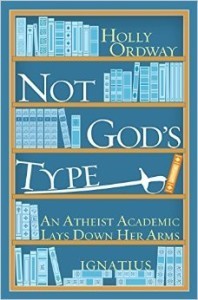 For many years, Holly Ordway was convinced that God was little more than superstition, unsupported by evidence or reason. She later attained a PhD in literature, traveled the country as a competitive fencer, and became a college English professor, none of which left room for God.
For many years, Holly Ordway was convinced that God was little more than superstition, unsupported by evidence or reason. She later attained a PhD in literature, traveled the country as a competitive fencer, and became a college English professor, none of which left room for God.
But one day a smart and respected friend surprised her by revealing he was a Christian. That shook Holly and sent her on a search for the truth about God, one that weaved through literature, aesthetics, imagination, and history. She came under the spell of the Inklings—C.S. Lewis, J.R.R. Tolkien, Charles Williams—and like many of them, began to find faith. Her journey culminated in 2012 when, after a short time in an Anglican community, she entered the Catholic Church.
Not God’s Type records her probing story and is fantastically written. At times Holly’s prose is almost poetic, causing you to pause and reflect on the simple elegance of her writing. Her conversion is also, in one sense, a journey through books. She describes how several books each led her one step forward, including Mere Christianity, The Lord of the Rings, In Defense of Miracles, N.T. Wright’s work, and more. Those two elements, the imaginative and the literary, make this an utterly unique conversion story.
For book lovers, fans of the Inklings, and anyone interested in how a sharpened atheist could end up Catholic, this book is for you.
5. Something Other Than God: How I Passionately Sought Happiness and Accidentally Found It
by Jennifer Fulwiler
Ignatius Press, 256 pages, hardcover
Released on April 29, 2014
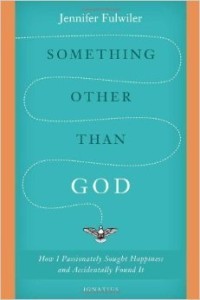 This is the third atheist-to-Catholic conversion story I read this year. Each shined in its own way. God in Proof grappled with the philosophical questions involved, and Not God’s Type showed how literature and imagination play a key role.
This is the third atheist-to-Catholic conversion story I read this year. Each shined in its own way. God in Proof grappled with the philosophical questions involved, and Not God’s Type showed how literature and imagination play a key role.
But as Pope Benedict XVI responded when asked how many paths there are to God, “As many as there are people.” Something Other Than God reveals another path.
Like the other two, this book is extremely well-written from a literary perspective. Jennifer’s pacing and development, her masterful balance of deep existential questions and light humor, carries the mark of a New York Times bestseller. Very few people can make good writing look so easy, but Jennifer does.
Also unique is how Jennifer finds her way to faith, which is essentially through despair. After pondering her atheism she arrives at nihilism, realizing that if there is nothing beyond the natural world, then there is no objective ground for meaning or human dignity. Yet she can’t accept that conclusion. Looking at her newborn son, she could not believe that he was simply a blob of matter different only in form, but not substance, from other animals or plants. That dissonance led her on a search for the “something more”, the transcendent source of these values she knew existed.
Of course, she didn’t want that “something” to be God (hence the title.) She hung tight to her atheism and honed her arguments against God by debating Christian friends, in person and online. But secretly she began reading books by Christian apologists and thinkers. She slowly made her way to theism, and then thanks especially to the counter-cultural moral teachings of the Catholic Church, she decided to become Catholic in 2007.
Again, I can’t emphasize how enjoyable and well-written this book is. If it wasn’t for the latent anti-Catholic bias among many bestseller lists (ahem, New York Times and Wall Street Journal), this book would have soared up many lists (and should have, based on the number of copies sold.) But that doesn’t matter. Regardless of where it’s listed, this is one of the spiritual memoirs I’ve read, certainly of this century, and rightfully stands alongside classics like Dorothy Day’s The Long Loneliness and Thomas Merton’s Seven Storey Mountain.
4. Michael Jordan: The Life
by Roland Lazenby
Little, Brown, and Company, 720 pages, hardcover
Released on May 6, 2014
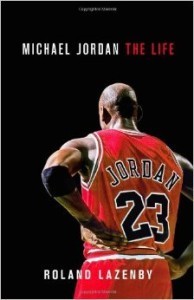 In 2013 I read Walter Issacson’s thick biography of Steve Jobs, whom he depicted as both complicated and transcendent, a visionary difficult to pin down. This year I tackled Roland Lazenby’s biography of Michael Jordan and discovered almost a mirror image.
In 2013 I read Walter Issacson’s thick biography of Steve Jobs, whom he depicted as both complicated and transcendent, a visionary difficult to pin down. This year I tackled Roland Lazenby’s biography of Michael Jordan and discovered almost a mirror image.
Both Jobs and Jordan were driven to perfection. Jobs demanded it from his designers, even when they crafted parts within a computer that consumers would never see. Jordan pursued it in every competitive activity, whether basketball, golf, or cards.
For both men, their gifts were also their downfall. Their single-minded commitment to perfecting their crafts led to dysfunction in their families and personal lives. Lazenby captures that especially well with Jordan. Despite being the best-known and perhaps richest athlete in human history, Jordan was never satisfied. He always wanted more, more success and domination, even if it cost him his marriage and his sanity.
For diehard basketball fans, Lazenby’s biography offers several fascinating anecdotes from Jordan’s time with the Bulls, as well as his later forays (and failings) with the Wizards and Bobcats. Lazenby’s greatest accomplishment, though, is confirming a timeless spiritual truth: that the very things that make us great—for Jordan his drive, focus, and confidence—can lead to our destruction if left unchecked.
3. 2 Samuel (Brazos Theological Commentary on the Bible)
by Fr. Robert Barron
Brazos, 240pages, hardcover
Released on May 5, 2015
 A perk of working at Word on Fire is that I had the privilege of editing Fr. Barron’s commentary on 2 Samuel. And do I ever mean privilege.
A perk of working at Word on Fire is that I had the privilege of editing Fr. Barron’s commentary on 2 Samuel. And do I ever mean privilege.
Fr. Barron’s contribution to the Brazos Theological Commentary Series is a unique blend of narrative, illuminating detail, and sharp exegesis. At the outset, Fr. Barron explains that his commentary is decidedly not a historical-critical commentary, which would probe 2 Samuel’s various sources and textual variants. Instead, it’s a theological commentary, constantly asking the question, “What does this passage reveal to us about God?”
The vivid story of David’s rise and fall sheds plenty of light on that question. It is, in many ways, the pivotal narrative in Scripture. It’s the hinge on which salvation history swings from the kingdom of Israel to the definitive and eternal King, born a son of David. Fr. Barron walks us through the story, pulling from Jewish tradition, the Church Fathers, contemporary biblical scholarship, and a healthy dose of art and literature. The resulting commentary is not just biblically astute but readable and mesmerizing. Commentaries typically scare off Christians outside of academia, but this is one of the most refreshing and accessible I’ve come across.
Although it won’t officially debut until mid-2015, you can pre-order it now.
2. The Ball and the Cross
by G.K. Chesterton
Dover, 192 pages, paperback
Originally published in 1909
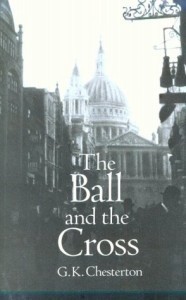 Being part of the Central Florida G.K. Chesterton Society meant I read a dozen Chesterton books this year. The Ball and the Cross was my runaway favorite. It features two of Chesterton’s most memorable characters—a zealous, Scotish Catholic who wears his faith on his sleeve, and a staunch, “free-thinking” atheist who distributes humanist literature. Both are deeply committed to their beliefs, so much so that they’re willing to fight (and die) for them. The problem is, nobody else takes them seriously. The two zealots are the last men in Europe who think religion is worth fighting over and thus, once they commit to a duel to finally settle their dispute, the whole country conspires to stop them.
Being part of the Central Florida G.K. Chesterton Society meant I read a dozen Chesterton books this year. The Ball and the Cross was my runaway favorite. It features two of Chesterton’s most memorable characters—a zealous, Scotish Catholic who wears his faith on his sleeve, and a staunch, “free-thinking” atheist who distributes humanist literature. Both are deeply committed to their beliefs, so much so that they’re willing to fight (and die) for them. The problem is, nobody else takes them seriously. The two zealots are the last men in Europe who think religion is worth fighting over and thus, once they commit to a duel to finally settle their dispute, the whole country conspires to stop them.
The Ball and the Cross is classic Chesterton, full of irony, humor, fast-paced dialogue, and several imaginative twists. In our religiously tepid world, which is even more ambivalent toward God than when Chesterton lived, this weighty novel demands we take faith seriously.
1. Essentialism: The Disciplined Pursuit of Less
by Greg McKeown
Crown, 272 pages, hardcover
Released on April 15, 2014
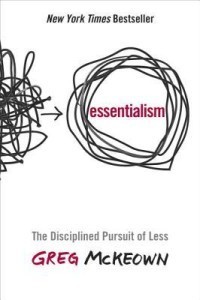 I just can’t stop talking about this book to friends and family. Of everything I read this year, Greg McKeown’s Essentialism changed my life the most. It’s affected every area for me—work, personal projects, reading, marriage, parenting, spiritual life—by forcing me to ask a simple question, over and over again: is this essential?
I just can’t stop talking about this book to friends and family. Of everything I read this year, Greg McKeown’s Essentialism changed my life the most. It’s affected every area for me—work, personal projects, reading, marriage, parenting, spiritual life—by forcing me to ask a simple question, over and over again: is this essential?
We all find ourselves bombarded with opportunities and requests, in no small part because of the Internet. We’re encouraged to join this program, take on this project, start that initiative, watch this video, reply to this email, sign up for this newsletter, meet with this person, etc. Since most of us are terrified of saying “No,” and because of our FOMO (fear of missing out), we constantly attempt to squeeze one more thing into our already-busy lives.
But as McKeown explains, this has devastating consequences. It leads to us majoring in minors and spending most of our time on the trivial many tasks instead of the essential few. The solution is to become an essentialist, one who takes on only pursuits that truly matter.
According to McKeown’s advice, any time you receive an invitation or request or feel the urge to take on a particular task, ask yourself, “On a scale of 1-10, how essential is this?” If the answer is anything eight or below, then it’s a zero. If it’s a nine or ten, you embrace it. That one piece of advice has already saved me hours and hours of good, but not essential commitments.
McKeown is not religious, but for me, as a Catholic, I repeatedly heard echoes in this book of Jesus’ command to pursue “the one thing necessary.” Jesus was an essentialist and it’s precisely what he demands of his followers.
The principles within Essentialism will declutter your life, teach you to say “no” to the non-essentials, and give you clarity on what you should be doing with your time. After just a few months of practicing these tactics I feel more focused and accomplished than at any point in my life.
What were some of your favorite books of 2014?
What I’ve Read in Past Years
2014
Books I Read in 2014
My 15 Favorite Books of 2014
2013
Books I Read in 2013
My 10 Favorite Books of 2013
2012
Books I Read in 2012
My 15 Favorite Books of 2012 – Part 1, Part 2, Part 3
2011
Books I Read in 2011
My 15 Favorite Books of 2011
2010
Books I Read in 2010
My 15 Favorite Books of 2010
The post My 15 Favorite Books of 2014 appeared first on Brandon Vogt.




February 2, 2015
5 New and Notable Books I’m Excited About (February 2015)
One perk of being a book reviewer is that publishers regularly send me a steady stream of advanced review copies.
I try to review as many as I can, but I can’t get to them all. So every couple months, I highlight a handful of new and upcoming books I’m particularly excited about.
(The descriptions below are either from the publisher or from Amazon.)
House of Hospitality (75th Anniversary Edition)
by Dorothy Day
Our Sunday Visitor, 175 pages, paperback
Released on February 26, 2015
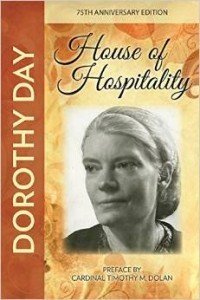 “A great many of these notes were not written for publication, but for my own self in moments of trouble and in moments of peace and joy.”
“A great many of these notes were not written for publication, but for my own self in moments of trouble and in moments of peace and joy.”
Dorothy Day’s reflections-written on the fly over five hectic years-reveal not only the beginnings of the Catholic Worker Movement, but the mind of a heroic woman as she responds to the demands of faith.
Now back in print after seventy-five years, House of Hospitality is packed with stories of sacrifice and kindness, strikes and protests, hunger and soup lines, the rough reality of tenement life, and the foul odor of poverty. “I do penance through my nose continually,” Dorothy wrote.
And yet, as she said, “Our lives are made up of little miracles day by day.” Dorothy Day and her fellow workers were “poor for the poor,” as Pope Francis has exhorted, and the early years of this Gospel-driven moment have much to teach us about how we can live, today, with a heart for others. “Love and ever more love,” Dorothy said, “is the only solution to every problem that comes up.”
The Thrill of the Chaste (Catholic Edition): Finding Fulfillment While Keeping Your Clothes On
by Dawn Eden
Ave Maria Press, 224 pages, paperback
Released on January 26, 2015
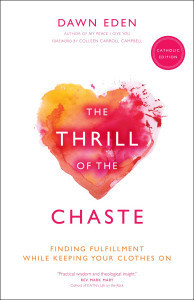 Dawn Eden, internationally known speaker and author, presents a completely revised Catholic edition of her bestselling work, The Thrill of the Chaste. In this version, Eden shares her story of conversion to Catholicism and invites readers into a Catholic understanding of chastity and its spiritual benefits.
Dawn Eden, internationally known speaker and author, presents a completely revised Catholic edition of her bestselling work, The Thrill of the Chaste. In this version, Eden shares her story of conversion to Catholicism and invites readers into a Catholic understanding of chastity and its spiritual benefits.
When Dawn Eden released The Thrill of the Chaste in 2006, she was a Jewish convert to Protestant Christianity, preparing to make the final leap into Catholicism. Now, nine years later, Eden has extensively updated The Thrill of the Chaste, sharing how her Catholic faith, the lives and intercession of the saints, and the healing power of the sacraments have led her to find her true identity in Christ.
This revised, Catholic version offers spiritual and practical advice for both men and women seeking to live chastely in a world that glorifies sex. Eden offers tips to help readers avoid temptation and live faithfully—including dressing modestly, but not being afraid to feel good about the way they look; trusting that God has a plan for their life and relationships; and making sure their “yes” comes from the heart.
Simply Good News: Why the Gospel Is News and What Makes It Good
by N.T. Wright
HarperOne, 208 pages, hardcover
Released on January 6, 2015
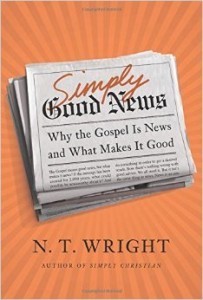 The bishop, Bible scholar, modern heir to C. S. Lewis, and revered author of Simply Christian and Simply Jesus offers a fresh look at the Gospel, explaining why Jesus’ message is “good news” and why it is more timely and transforming today than we know.
The bishop, Bible scholar, modern heir to C. S. Lewis, and revered author of Simply Christian and Simply Jesus offers a fresh look at the Gospel, explaining why Jesus’ message is “good news” and why it is more timely and transforming today than we know.
The Gospel means good news. But if the message has been around for 2,000 years, what makes it significant today? What’s so “good” about stories involving damnation, violence, and a God who sacrifices his only son?
Noted Bible scholar N.T. Wright shows us how Christians today have lost sight of what the “good news” of the gospel really is. In Simply Good News, he takes us back in time to reveal how the people of the first-century—the gospel’s original audience—would have received Jesus’ message. He offer a clear and thoughtful analysis of what the “good news” really is, and applies it to our lives today, revealing its power to transform us.
The Mystical Body of Christ
by Fulton J. Sheen
Ave Maria Press, 352 pages, paperback
Released on March 9, 2015
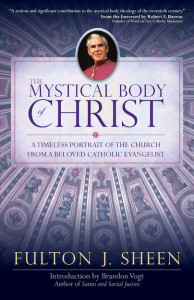 The Mystical Body of Christ captures the theological brilliance of Venerable Fulton J. Sheen, nationally renowned Catholic television and radio personality, before his meteoric rise to fame in the 1950s. First published in 1935, this book reveals Sheen’s accessibility and theologically astute teaching styles as he writes about the Church as an extension of the Incarnation. Recent advances in his cause for canonization make this classic text especially timely.
The Mystical Body of Christ captures the theological brilliance of Venerable Fulton J. Sheen, nationally renowned Catholic television and radio personality, before his meteoric rise to fame in the 1950s. First published in 1935, this book reveals Sheen’s accessibility and theologically astute teaching styles as he writes about the Church as an extension of the Incarnation. Recent advances in his cause for canonization make this classic text especially timely.
Sheen’s radio and television broadcasts, including Life Is Worth Living, have reached millions of homes since the 1950s. With more than thirty of his works still in print, Sheen is one of the most beloved Catholic evangelists of all time.
This full-length and fully developed work on the Church as an extension of the Incarnation reveals Sheen’s accessible and theologically astute teaching style in the early years of his ministry. First published in 1935, the book’s themes of the Eucharist as a source of unity for the Mystical Body of Christ—the Church—and the link between the liturgy and works of social justice were echoed in the Second Vatican Council several decades later.
A recent advance in Sheen’s cause for beatification, the healing of a young boy for which there is no medical explanation, will create renewed interest among his admirers and introduce the spirituality of this Catholic icon to a whole new generation of believers.
Filling Our Father’s House: What Converts Can Teach Us About Evangelization
by Shaun McAfee
Sophia Institute Press, 200 pages, paperback
Released on March 17, 2015
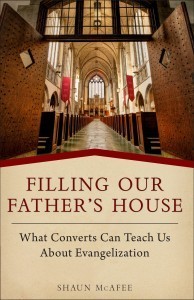 Converts often bring to the Catholic Church an evangelical zeal that can renew and energize even the most tired and battle weary among us.
Converts often bring to the Catholic Church an evangelical zeal that can renew and energize even the most tired and battle weary among us.
The Church is hurting for enthusiastic voices to proclaim her teachings on truth and morals. In these pages, Shaun McAfee, a convert from Evangelical Protestantism shows how we can take the best tools of evangelization and use them to reach countless souls with the fullness of the Christian Faith.
With Shaun’s help, you’ll learn simple ways you can make the visitor in your parish more at home, how to speak compellingly about the Faith, simple ways to integrate daily Scripture reading into your life, why small groups are important for spiritual enrichment, and how to communicate with souls who have never considered joining the Catholic Church.
The simple steps Shaun outlines in these pages will also show priests and lay leaders how to more effectively engage modern society with our Catholic Faith.
Our society is awash in secularism. It’s eating away at the sense of God, and the emptying of the pews in our own parishes is its natural effects. What we need is a renewal of enthusiasm for the battle against secularism and this book is a beginner’s guide to getting us back on track.
What new and notable books are you looking forward to?
The post 5 New and Notable Books I’m Excited About (February 2015) appeared first on Brandon Vogt.




January 30, 2015
Ignatius “Didache Bible” Giveaway!
“Find out how much God has given you and from it take what you need; the remainder is needed by others.” – St. Augustine
Since I’ve built up a large collection of extra books and resources, every week I give some away absolutely free, no strings attached. Each giveaway lasts seven days with a new one beginning every Friday. You can enter any time during the week. Check out my past giveaways here.
Today I’m giving away a copy of Ignatius Press’ brand new Didache Bible with Commentaries Based on the Catechism of the Catholic Church.
The Didache Bible with Commentaries Based on the Catechism of the Catholic Church
Ignatius Press
1,960 pages, hardcover
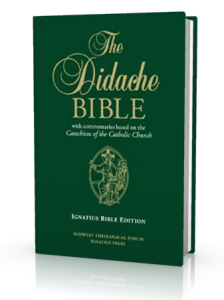 The Didache Bible presents extensive commentaries, based on the Catechism of the Catholic Church, for each of the books of the Holy Bible. It also includes numerous apologetical inserts to assist the reader in understanding the Church’s teachings on current issues.
The Didache Bible presents extensive commentaries, based on the Catechism of the Catholic Church, for each of the books of the Holy Bible. It also includes numerous apologetical inserts to assist the reader in understanding the Church’s teachings on current issues.
It uses the Revised Standard Version, Second Catholic Edition translation of the complete text of Sacred Scriptures, Old and New Testaments. This Bible version is considered by many Catholic leaders and authors, including Peter Kreeft and Scott Hahn, as the most beautiful English translation of the Bible today.
The Didache Bible is a valuable resource for students and those participating in Scripture studies. Ideal for anyone seeking a deeper understanding of the Catholic faith and intended to be accessible by all Catholics in its level of scriptural scholarship.
SPECIAL FEATURES:
Twenty-seven full-color biblical maps, including the journeys of Jesus Christ.
More than 100 apologetical explanations that help to answer common questions about the faith
Comprehensive, forty-three page glossary and a topical index.
Large 6″ x 9″ size
The font size for the text of Scripture is 9.5 points which is comparable to the font size used in most business letters.
The font size for the text of commentary is 8.5 points.
Sewn binding
I’m using Rafflecopter to help with the giveaway, which is cool because it allows you multiple entries for commenting, posting on Facebook, sharing on Twitter, etc. Click below to enter:
(If you’re reading this through email or RSS and don’t see the giveaway widget, click here.)
By entering this giveaway you agree to occasionally receive email updates from me—no spam, just updates about free books, cool links, and exciting news.
The winner(s) will be randomly selected next Friday and the books will be sent out, free of charge, shortly thereafter.
In the future I’ll be giving away more books and resources, sometimes multiple items per giveaway! So subscribe via feed reader or email to ensure you never miss your chance to win.
(Since I’m covering the shipping costs, only residents within the continental United States are eligible to win.)
The post Ignatius “Didache Bible” Giveaway! appeared first on Brandon Vogt.




January 27, 2015
Learning from an Innovator of an Avante-garde Way for Single Women
Today we continue our regular series called “Learning from the Saints.” Our guide is expert Bert Ghezzi, a dear friend of mine and the author of numerous books including Voices of the Saints, Saints at Heart, and Discover Christ: Developing a Personal Relationship with Jesus.
His more recent books are The Heart of Catholicism and Prayers to the Holy Spirit. You can learn more about Bert and his work at BertGhezzi.com.
Today, Bert profiles St. Angela Merici, a single laywomen who launched a worldwide movement.
Women like St. Teresa of Avila and St. Catherine of Genoa contributed significantly to the Catholic Reformation. But in the sixteenth-century Church perhaps no woman responded more creatively to the need for reform than St. Angela Merici. She built communities that trained single women in Christian living and provided them a secure place of honor in their local societies.
 A single lay woman herself, St. Angela established support groups for unmarried women of all classes in Brescia and other north Italian cities. She wanted the women to be in the world, but not of it. So they consecrated themselves to God and promised to remain celibate. But they lived at home with their parents and grandparents and looked for ways to serve their neighbors.
A single lay woman herself, St. Angela established support groups for unmarried women of all classes in Brescia and other north Italian cities. She wanted the women to be in the world, but not of it. So they consecrated themselves to God and promised to remain celibate. But they lived at home with their parents and grandparents and looked for ways to serve their neighbors.
In 1535, Angela organized the groups into the Company of St. Ursula, later called the Ursulines. Unique for its time, her avant-garde association anticipated modern secular institutes and covenant communities.
St. Angela gave the Ursulines a military structure, dividing towns into districts governed hierarchically by mature Christian women. This design allowed the community to support members in daily Christian living and protect them from spiritually unhealthy influences.
The rule that Angela wrote for the company required members to remain faithful to the Christian basics. In the following excerpt, she explains the importance of daily vocal and mental prayer:
“Each one of the sisters should be solicitous about prayer, mental as well as vocal, that is a companion to fasting. For Scripture says prayer is good with fasting. As by fasting we mortify the carnal appetites and the senses, so by prayer we beg God for the true grace of spiritual life. Thus, from the great need we have of divine aid, we must pray always with mind and heart, as it is written, ‘Pray constantly’ (1 Th 5:17; NJB). To all we counsel frequent vocal prayer that prepares the mind by exercising the bodily senses. So each one of you, every day will say with devotion and attention at least the Office of the Blessed Virgin and the seven penitential psalms (Ps 6, 32, 38, 51, 102, and 130) because in saying the office we are speaking with God.
“To afford matter and some method in mental prayer, we exhort each one to raise her mind to God and to exercise herself in it every day And so in the secret of her heart, let her say:
‘My Savior, illumine the darkness of my heart, and grant me grace rather to die than to offend your Divine Majesty any more. Guard, O Lord my affections and my senses, that they may not stray, nor lead me away from the light of your face, the satisfaction of every afflicted heart.
‘I ask you, Lord, to receive all my self-will that by the infection of sin is unable to distinguish good from evil. Receive, O Lord, all my thoughts, words, and deeds, interior and exterior, that I lay at the feet of your Divine Majesty. Although I am utterly unworthy, I beseech you to accept all my being.'”
At St. Angela Merici’s death in 1540 she had started twenty-four groups. Over the years, the Ursulines have flourished as the oldest and one of the most respected of the church’s teaching orders.
To the long list of authorities Ursulines were to obey—Ten Commandments, church, parents, civil laws—St. Angela added “divine inspirations that you may recognize as coming from the Holy Spirit.” It produced a refreshing and liberating rule, but also a dangerous one, for when it’s obeyed, the Holy Spirit may act in unexpected ways.
(Image Credit: The Love Note Inc.)
Read more from Bert at his website www.BertGhezzi.com, or check out his many books on Amazon.
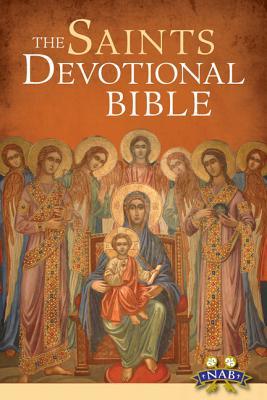
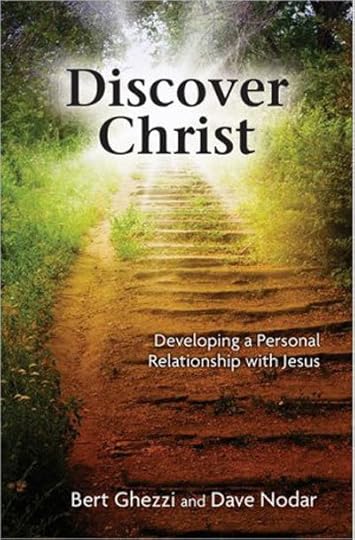
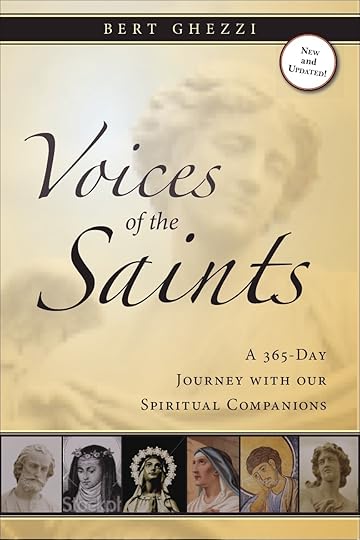
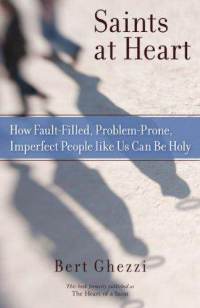
The post Learning from an Innovator of an Avante-garde Way for Single Women appeared first on Brandon Vogt.




January 23, 2015
“The Power of Daily Mass” Book Giveaway!
“Find out how much God has given you and from it take what you need; the remainder is needed by others.” – St. Augustine
Since I’ve built up a large collection of extra books and resources, every week I give some away absolutely free, no strings attached. Each giveaway lasts seven days with a new one beginning every Friday. You can enter any time during the week. Check out my past giveaways here.
Today I’m giving away TEN copies of Bert Ghezzi’s new book, titled The Power of Daily Mass.
The Prodigal You Love: Inviting Loved Ones Back to the Church
by Bert Ghezzi
Ave Maria Press, 128 pages, paperback
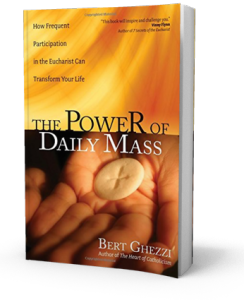 Bestselling author, speaker, editor, and media personality Bert Ghezzi has been a leading figure in American Catholic life for more than forty years. In The Power of Daily Mass, he reveals how the Eucharist is the center of his daily life and calls him to witness the Real Presence of Christ to others in his work and relationships. Ghezzi shows how frequent participation in the Mass offers participants courage and hope to face everyday challenges, provides direction and encouragement through the scriptures, allows time to reflect and talk to the Lord, and is an opportunity to intercede for family and friends.
Bestselling author, speaker, editor, and media personality Bert Ghezzi has been a leading figure in American Catholic life for more than forty years. In The Power of Daily Mass, he reveals how the Eucharist is the center of his daily life and calls him to witness the Real Presence of Christ to others in his work and relationships. Ghezzi shows how frequent participation in the Mass offers participants courage and hope to face everyday challenges, provides direction and encouragement through the scriptures, allows time to reflect and talk to the Lord, and is an opportunity to intercede for family and friends.
Using quotations from saints and testimonies from fellow daily Mass attendees, Ghezzi encourages Catholics to grow closer to Jesus and receive Christ’s power for daily Christian living through the Eucharist. Ghezzi highlights how more frequent participation in weekday Mass is a wonderful way to grow in love for the Lord and receive the guidance for living that can only come from scripture and the Eucharist.
I’m using Rafflecopter to help with the giveaway, which is cool because it allows you multiple entries for commenting, posting on Facebook, sharing on Twitter, etc. Click below to enter:
(If you’re reading this through email or RSS and don’t see the giveaway widget, click here.)
By entering this giveaway you agree to occasionally receive email updates from me—no spam, just updates about free books, cool links, and exciting news.
The winner(s) will be randomly selected next Friday and the books will be sent out, free of charge, shortly thereafter.
In the future I’ll be giving away more books and resources, sometimes multiple items per giveaway! So subscribe via feed reader or email to ensure you never miss your chance to win.
(Since I’m covering the shipping costs, only residents within the continental United States are eligible to win.)
The post “The Power of Daily Mass” Book Giveaway! appeared first on Brandon Vogt.




Brandon Vogt's Blog
- Brandon Vogt's profile
- 75 followers




